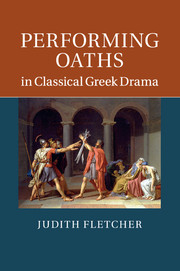Book contents
- Frontmatter
- Contents
- Acknowledgments
- A note on abbreviations
- Introduction
- Chapter 1 From curses to blessings: horkos in the Oresteia
- Chapter 2 Speaking like a man: oaths in Sophocles’ Trachiniae and Philoctetes
- Chapter 3 Horkos in the polis: Athens, Thebes and Sophocles
- Chapter 4 Perjury and other perversions: Euripides’ Phoenissae, Orestes and Cyclops
- Chapter 5 Twisted justice in Aristophanes’ Clouds
- Chapter 6 Women and oaths in Euripides
- Chapter 7 How to do things with Euripides: Aristophanes’ Thesmophoriazusae
- Chapter 8 Swearing off sex: the women's oath in Aristophanes’ Lysistrata
- Conclusion
- Bibliography
- Index locorum
- General index
Conclusion
Published online by Cambridge University Press: 05 December 2011
- Frontmatter
- Contents
- Acknowledgments
- A note on abbreviations
- Introduction
- Chapter 1 From curses to blessings: horkos in the Oresteia
- Chapter 2 Speaking like a man: oaths in Sophocles’ Trachiniae and Philoctetes
- Chapter 3 Horkos in the polis: Athens, Thebes and Sophocles
- Chapter 4 Perjury and other perversions: Euripides’ Phoenissae, Orestes and Cyclops
- Chapter 5 Twisted justice in Aristophanes’ Clouds
- Chapter 6 Women and oaths in Euripides
- Chapter 7 How to do things with Euripides: Aristophanes’ Thesmophoriazusae
- Chapter 8 Swearing off sex: the women's oath in Aristophanes’ Lysistrata
- Conclusion
- Bibliography
- Index locorum
- General index
Summary
Fifth-century Athens was an ideological construct as much as it was a physical reality. According to my theoretical perspective, it was the consequence of a dynamic complex of speech acts performed over many years in diverse contexts. To put it more simply: Athens was a city that did things with words. Perhaps the most monumental “thing” that it did was to create and maintain its own civic identity. On the most obvious level, its citizens used language to make and enact policies and laws in the assembly and courts. These larger structures of Athenian governance, put into place by speech acts of an institutional nature (in Searle's terms), directly or indirectly programmed the behavior, or at least affected the lives, of all members of the polis. Hopefully I have demonstrated that the oath was an essential tool of this illocutionary community, and that its conventions, structures and strictures, which took account of gender, status and citizenship, bore the imprimatur of the political principles and social customs of Athens.
Athenian culture, specifically drama, reflects this ideology and will often reinforce the social construction of status, gender and ethnicity in fifth-century Athens by representing the ritual performances that helped to sustain these identities. The enactment of oaths in the theatrical spaces of Athens draws attention to a social drama in which real citizens performed the same or similar oaths as actors in the theatrical fantasy. Characters such as Orestes, who swear oaths, provoke some form of identification with an audience who had performed or witnessed the same ritual. As I have tried to illustrate, the oath rituals of Athenian drama reiterate military treaties, the protocols of ritual friendship, oaths of citizenship, the oaths sworn by jurors, litigants, accused parties and their witnesses, as well as oaths that ratify commercial transactions, or membership in religious cults. Like a dramatic text, an oath is infinitely repeatable. Every promise it secures is slightly different, but its form is traditional and consistent. And although other people could use its formula in other places, Athenian drama suggests that its special prestige and authority were uniquely characteristic of their own preeminent polis.
- Type
- Chapter
- Information
- Performing Oaths in Classical Greek Drama , pp. 241 - 248Publisher: Cambridge University PressPrint publication year: 2011



